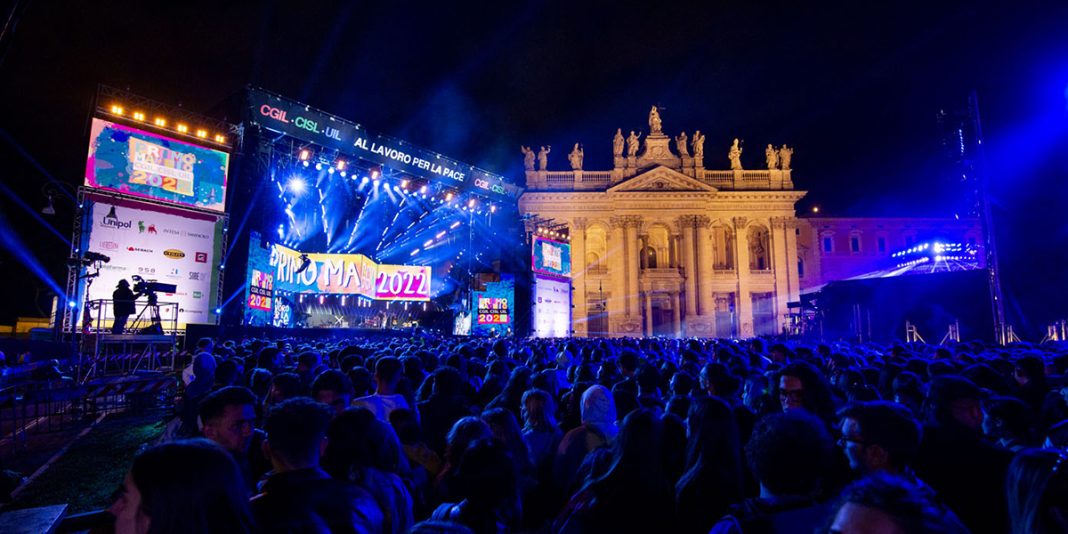After a two-year shutdown caused by the COVID-19 pandemic, Primo Maggio, a traditional concert to celebrate Labour Day in Italy, returned to Rome’s Piazza San Giovanni with some 60,000 people in attendance.
Known locally as ‘concertone’, the musical event was organised by Italy’s trade unions and attracts established acts alongside rising stars from the Italian music industry. It is used as a platform to promote workers’ rights, confronting issues ranging from discrimination against women to safety in the workplace.
This year, the implementation of the K-array sound reinforcement system and production for the event was entrusted to iCompany, whose slogan ‘at work for peace’, marked both the return to work for entertainment workers and the tragedy of the war in Ukraine. A cast of more than 50 performers entertained the audience in a glittering 10-hour show watched by three million RAI television viewers.
K-array Product Specialist, Klaus Hausherr, assumed the role of Systems Designer, and was tasked with manning the main PA between the LED screen and the stage, with 18 Firenze-KH7 line arrays – nine on each side – and a front sub line consisting of nine Firenze-KS8 subwoofers and 10 Firenze-KS5 subwoofers in a digital arc configuration.
Eight further Mugello-KH2P small format line arrays were deployed as frontfills. “My goal was to create as much uniformity of sound as possible over the whole area, and Firenze’s Slim Array Technology was crucial in that process,” commented Hausherr.
“Several factors were at play here – firstly the loading of the transducers is designed to result in a fast and stable impulse response that allows good directivity control, favouring powerful and extremely defined sound.”
According to Hausherr, the ‘partially open rear design’ created a ‘cardioid directivity pattern’ which limited resonances inside the box and hereby minimised the risk of feedback due to ‘low-frequency energy build-up’ on stage. “Firenze’s Electronic Beam Steering technology was also a contributing factor because it allowed us to aim the combined output of an array to give the required coverage while flying a perfectly straight hang, with no angles, benefiting a very fast assembly and a very small footprint at the hanging points – and that saved time and simplified the process of rigging the PA,” he explained.
Four identical delay systems consisting of eight Mugello-KH2 line arrays and four subwoofers were flown to provide far-field coverage, two systems in the tower behind the FOH position, open about 30° to each other to increase their coverage, and two systems in the delay towers furthest from the Plaza.
K-array also provided additional equipment in the form of two Mastiff-KM312 wedge monitors, two drumfills consisting of a Dragon-KX12 audio point source on a Thunder-KS3P subwoofer, as well as a flown side fill system of four Mugello-KH2P and two Thunder-KS3P subwoofers on each side of the stage.
“I was very satisfied with the result,” concluded Hausherr. “The crew were delighted, and the PA system, despite being almost invisible, performed well over a wide volume range without ever going into clipping. I also received a lot of positive feedback from the sound engineers who followed during the day.”
FOH Engineer, Enrico Romanelli enjoyed his experience with Firenze. “I was pleasantly surprised by the performance of this system. We mixed about 40 bands of varying genres throughout the show and the PA system always responded optimally.”
Romanelli praised the ‘perfect response’ of the sound system when it was put to the test at the hands of multiple engineers. “Those who took turns at the console during the day confirmed my impression. All of this, not to be underestimated, from a very small PA with very little visual impact – it’s basically like having an invisible sound system. How many times over the years have we been faced with customers who told us, ‘the sound system must not be seen!’ Surely there is no better choice, what can I say – much more than just a positive experience,” he concluded.
This article originally appeared in issue #270 of TPi, which you can read here.





